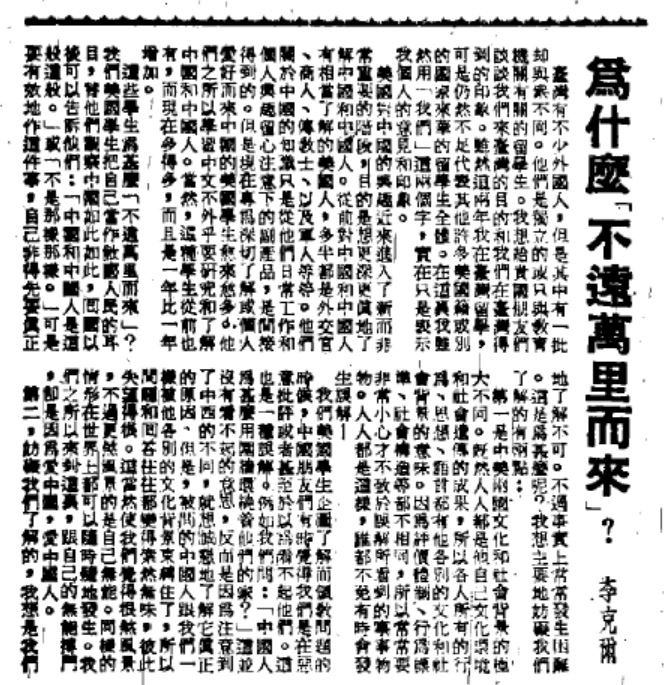
There are a lot of foreigners in Taiwan. Among them is a group that is different from the rest—students here studying Chinese either independently or as part of an educational program. I would like to share some of the reasons we foreign students come to Taiwan and some of our impressions of this country. Even though I have been studying here for two years, my experiences do not represent those of other foreign students. While I use "we" throughout this essay, what I am actually referring to are just my own experiences and opinions.
臺灣有不少外國人,但是其中有一批却與眾不同。他們是獨立的或只與教育機關有關的留學生。我想給貴國朋友們談談我們來臺灣的目的和我們在臺灣得到的印象。雖然這兩年我在臺灣留學,可是仍然不足代表其他許多美國籍或別的國家來華的留學生全體。在這裏我雖然用「我們」這兩個字,實在只是表示我個人的意見和印象。
American interest towards China has entered a new phase; one in which Americans wish to have a deeper understanding of China and its people. In the past, Americans who had some understanding of China were diplomats, business people, missionaries, and military personnel. They gained this knowledge passively through their work and daily lives. Chinese learners today include students who seek a deeper understanding of the culture for research or personal interests. Of course, such students existed in the past, but recently their numbers have begun to increase.
美國對中國的興趣近來進入了新而非常重要的階段,目的是想更深更真地了解中國和中國人。從前對中國和中國人有相當了解的美國人,多半都是外交官、商人、傳教士、以及軍人等等。他們關於中國的知識只是從他們日常工作和個人興趣留心注意下的副產品,是間接得到的。但是現在專為深切了解或個人愛好而來中國的美國學生愈來愈多。他們之所以學習中文不外乎要研究和了解中國和中國人。當然,這種學生從前也有,而現在多得多,而且是一年比一年增加。
Why do foreign students think it's worth coming all this way to study Chinese culture? We have become a medium by which our fellow countrymen and women can learn about China. When we go back, we can tell people what China is like and dispel myths about it. But we can only do this if we ourselves first have a deeper understanding of Chinese society. In reality, we often encounter many difficulties. I would like to share two reasons I think these difficulties arise.
這些學生為甚麼「不遠萬里而來」?我們美國學生把自己當作敝國人民的耳目,替他們觀察中國如此如此,回國以後可以告訴他們:「中國和中國人是這般這般。」或「不是那樣那樣。」可是要有效地作這件事,自己非得先要真正地了解不可。不過事實上常常發生困難。這是為甚麼呢?我想主要地妨礙我們了解有兩點:
First, American and Chinese culture are very different. We are all products of our environment, and a person's behavior, thoughts, and language are all dictated by their cultural and social background. Because we have different values, standards of behavior, and societal structures, we have to be careful not to misunderstand what we encounter. This is just human nature and unavoidable.
第一是中美兩國文化和社會背景的極大不同。既然人人都是他自己文化環境和社會遺傳的成果,所以各人所有的行為、思想、語言都有他個別的文化和社會背景的意味。因為評價體制、行為標準、社會構造等都不相同,所以常常要非常小心才不至於誤解所到的事事物物。人人都是這樣,誰都不免有時會發生誤解.
When American students try to understand a certain problem in Chinese society, our Chinese friends often think we are criticizing or even looking down on their culture. This is one type of misunderstanding. For example, when Americans ask, "Why do Chinese people build walls around their homes?" This question is not meant to look down on this practice; we asked because we simply noticed something that is different between our two societies, and we would genuinely like to understand why Chinese people build walls around their houses. Because the person asking and the person expected to respond look at this issue from different cultural backgrounds, the answer might prove unsatisfactory and result in mutual disappointment.
我們美國學生企圖了解而領教問題的時候,中國朋友們有時覺得我們是在惡意批評或者甚至於以為看不起他們。這也是一種誤解。例如我們問:「中國人為甚麼用圍牆環繞著他們的家?」這並沒有看不起的意思,反而是因為注意到了中西的不同,就想誠懇地了解它真正的原因,但是,被問的中國人跟我們一樣被他各別的文化背景束縛住了,所以問題和回答往往都變得索然無味,彼此失望得很。
This makes us feel uncomfortable and at a loss for what to do. This can of course happen anywhere in the world. Despite everything, the reason we come here and are willing to struggle is because we love China and its people.
這當然使我們覺得很煞風景,不過更煞風景的是自己無能。同樣的情形在世界上都可以隨時隨地發生。我們之所以來到這裏,跟自己的無能搏鬥,却是因為愛中國,愛中國人。
The second factor that I believe hinders our understanding is our expectations towards China and Chinese people. These expectations are set by how China is discussed in our country and the explanations and impressions China gives of itself. This results in us coming to Taiwan with certain prejudices. Most Chinese people don't think and behave the way Confucius and Sun Yat-Sen behaved, just like most Americans today do not think and behave like George Washington or Abraham Lincoln. Some Americans probably hold such beliefs because they learned about Confucian thought and have seen slogans and signs in public lauding Confucianism.
第二,妨礙我們了解的,我想是我們對於中國和中國人的預想。這些預想一部分是在敝國國內鹽酒中國方法的結果,一部分是中國人給外國人解釋自己方法的結果。因此原封不動地完全接納,所以帶著偏見而來臺灣。普通中國人的思想行為,並不像孔子和孫中山先生一樣,正等於美國的「街上人」的想法作法,並不像華盛頓和林肯的一樣。不過,那只是在我們研究了儒家思想傳統的影響,跟看到了在公共場所那些標語以後,才使我們有這樣的看法。
When many American students arrive in Taiwan, they naively think they already understand Chinese culture. When they encounter a Chinese person whose etiquette is very different from what they expected, they are shocked. They have just discovered an uncommon custom, in an unfamiliar situation, presented to them in a completely unexpected fashion. But guests who are bound by their expectations will inevitably offend their hosts or be offended by them.
剛來臺灣的美國學生很天真的以為他甚麼都了解。等到他一旦發現以講究禮節出名的中國人,有跟他不同的禮節標準時,就會大吃一驚。他所發現的是一種前所未料的禮法之宜忌,前所未料的場合,按照前所未有的標準來施行的禮節。客人被自己的預想綁住多久,就要得罪或受辱於主人多久。
Anyhow, we may not be sure what we have learned upon returning to our countries, but we can say, at the very least, that we understand what we do not know. Our ultimate goal is compassion, and to have compassion we must first understand our differences.
無論如何,我們回國的時候,雖然還不完全清楚我們了解的是甚麼,但已至少很清楚地知道我們所不了解的是甚麼。
總之,目的是為了了解,而了解的究極目的是愛。
Allow me to give you one final example. One day on the street, a four or five-year-old pointed at me and said, "Look! A foreigner!" His older brother, who was maybe eight or nine, shook his head and said, "No, he's an American!" Perhaps one day, children everywhere will stop noticing such differences; that is the day we will have achieved our ultimate goal.
有一天在街上,一個四、五歲的小孩用手指著我叫:「你看!外國人!」他八、九歲的哥哥搖著頭說:「不是,不是!美國人!」等到世界上所有的小孩,不管是哪一國家的,都能簡潔地叫「不是,不是!人!」我們就達到那究極目的了。
Published in Central Daily News (中央日報), page 6, July 11, 1965
Translated by Mpaza Kapembwa(蔣鵬博)
Edited by Sabrina Castle(宋玉萍)and 邱筱涵(Sheau-Harn Chiou)
© ICLP-NTU. ALL RIGHTS RESERVED.